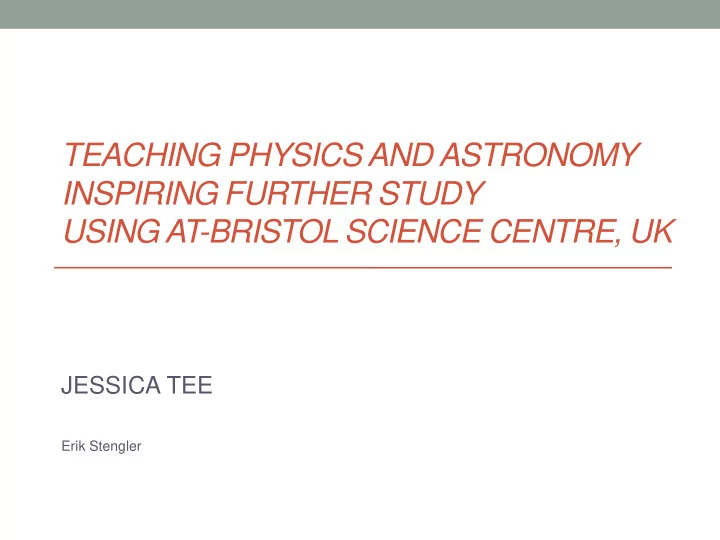

TEACHING PHYSICS AND ASTRONOMY INSPIRING FURTHER STUDY USING AT-BRISTOL SCIENCE CENTRE, UK JESSICA TEE Erik Stengler
My research • I have developed a real passion for physics and astronomy as part of my degree. • I wanted to explore how to ignite that passion in children at a young age to encourage their further study and the role that science centres can play in this. • I worked closely with both the AT-Bristol science centre and Shield Road Primary School in Bristol, UK to conduct my research. • I wanted to explore whether encouragement and solid understanding from early on, can strongly influence future study choices particularly in physics/ astronomy which have not always been popular subjects for further study.
Key terms • NC- National Curriculum - Government accredited syllabus for all state education in England • KS2- Key Stage 2- Children aged between 7-11 in years 3, 4, 5 and 6 at primary school • At-Bristol- UK based interactive science centre and planetarium • HE- Higher Education – Post secondary optional education
What Sufficient teaching and engagement in science subjects - inside and outside of the classroom: does it increase voluntary further study in this field? NC and school taught science modules have improved- increased study in physics and astronomy at HE Ensuring pupils engage from as early as lower key stages in these subjects Informal and formal reinforcement from science centres
How Exhibit texts Planetarium show content analysis content analysis QUANTITATIVE Science centre’s QUALITATIVE KS2 teacher Education officer interview interview KS2 pupils views
WHY KS2 Research shows pupils as early as Key Stage 2 are able to make conscious and individual decisions in science subjects: Decisions made at KS2 – reflect in later key stages and beyond However, just 5/14 compulsory modules taught on NC are related to physics/astronomy
Results • Content analysis methods: Clear alignment between NC subjects and current exhibits Physics (NC) Total Physics Total (exhibit) Light 41 Light 28 Sound 31 Sound 11 Magnet 21 Magnet 16 Force 9 Force 9 Electricity 7 Electricity 11 Gravity 1 Gravity 11
Results • Analysis of KS2 planetarium show: ¾ of the NC content appear in the planetarium show transcript P-value of <0.05 Increased incidence of relevant key words: Astronomy Total Astronomy Total (NC) (transcript) Earth 11 Earth 39 Sun 8 Sun 28 Moon 5 Moon 16 Solar System 5 Solar System 21 Planets 21 Planets 4 Space 6 Space 1
Results • Interview with a professional Educations Officer from At- Bristol. Summary: Overall, learning inside and outside of the the classroom is significant Science centres are undoubtedly a useful, accessible resource for schools and the general public Questions can be answered and explored with specialized staff in subjects such as physics and astronomy
Results • Views and observations collected by a KS2 teacher from pupils: Exploring KS2 pupils’ perceptions
Results • The KS2 teacher was asked for her professional view relating to the NC content and learning science outside of the classroom:- Agreed that visiting science centres reinforces NC content and encourages further learning Stated that upper key stage teaching staff agree physics/astronomy based modules should be increased/ encouraged at lower Key Stages.
Conclusion and Recommedations Conclusions • Evidence gathered showed a positive correlation between At- Bristol and KS2 NC content = effective resource in supporting content taught in physics and astronomy. • Interactive science centres are undoubtedly useful in reinforcing formal education as well as offering specialist knowledge outside of the curriculum Recommendations • Use research as encouragement is needed to ensure schools make the most of the science centres available for their use • Government publicity and funding could be motivated using research • Use research to inspire future scientists in the next generation
Q&A I’m really keen to continue exploring this area of work. It would be great to keep in touch ! Jessica-t@hotmail.co.uk
Recommend
More recommend